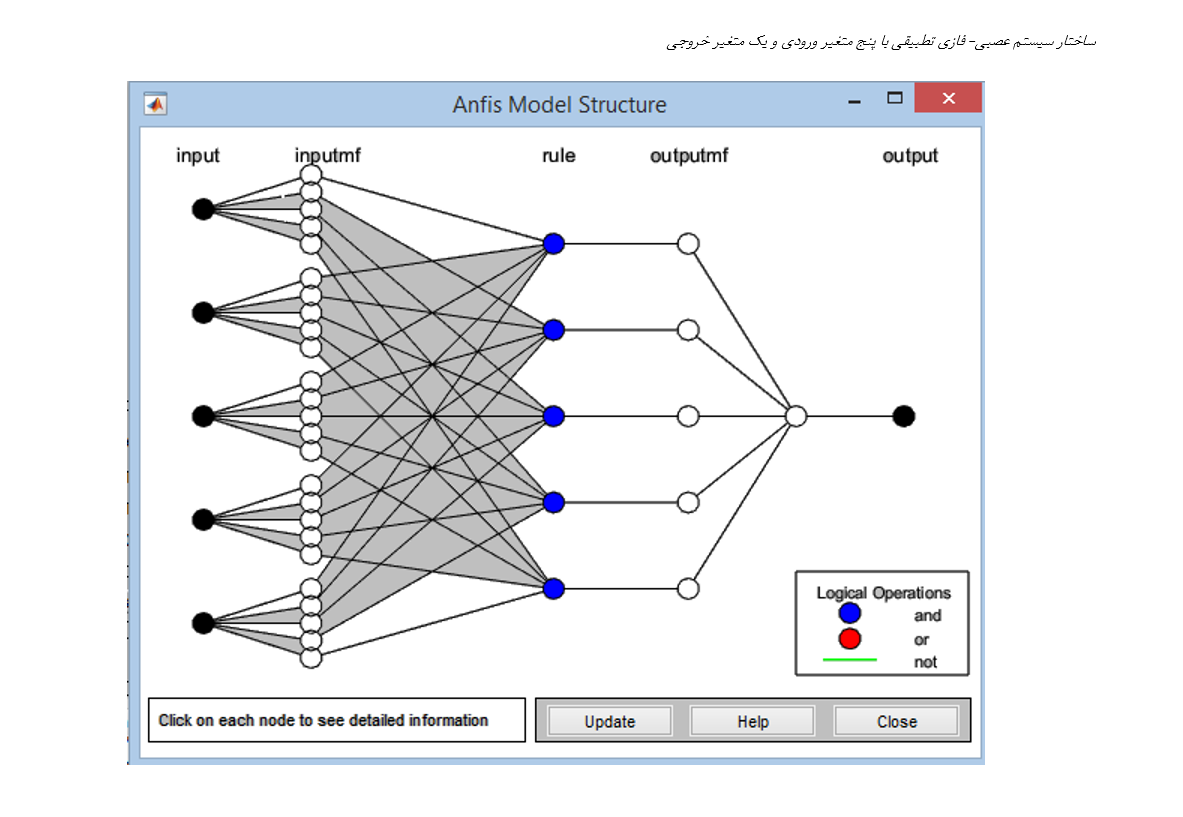ارزیابی عملکرد برند با استفاده از سیستم عصبی- فازی تطبیقی (مطالعه موردی: بیمه ایران)
کلمات کلیدی:
عملکرد برند, سیستم عصبی- فازی تطبیقی, بیمه ایرانچکیده
عملکرد تجاری به عملکرد برند وابسته است. بخش زیادی از موفقیت کسب و کار، ناشی از عملکرد برند است؛ لذا آگاهی از عملکرد برند بر اساس ارزیابی عملکرد ضروری است. بر همین اساس هدف این پژوهش ارزیابی عملکرد برند شرکت بیمه ایران با استفاده از سیستم عصبی- فازی تطبیقی بوده است. این پژوهش بر اساس هدف، کاربردی- توسعهای و بر اساس روش انجام پژوهش توصیفی- تحلیلی بوده است. جامعه آماری پژوهش بر اساس متغیرهای پژوهش شامل دو دسته مدیران و مشتریان بیمه ایران بوده است. به منظور گردآوری دادهها از دو پرسشنامه استفاده شده است. پرسشنامه اول به منظور سنجش عوامل موثر بر عملکرد برند(ورودیهای سیستم) و پرسشنامه دوم به منظور سنجش عملکرد برند(خروجی) بوده است.. به منظور تحلیل دادهها در این تحقیق از تحلیل عاملی تأییدی و سیستم عصبی- فازی تطبیقی(ANFIS) در جهت ارزیابی عملکرد برند استفاده شده است. نتایج نشان میدهد که عملکرد برند شرکت بیمه ایران برابر 46/3 بدست آمده است. با توجه به اینکه مقادیر ووردی و خروجی سیستم بر اساس طیف پنجتایی لیکرت ایجاد شده بود، بر همین اساس عنوان گردید که عملکرد برند شرکت بیمه ایران بالاتر از حد متوسط بوده است. سیستم طراحی شده در این مقاله میتواند به عنوان یک سیستم پشتیبان تصمیم تلقی شده که از طریق آن بتوان عملکرد برند را در هر لحظه مورد ارزیابی قرار داد. این سیستم به مدیران این امکان را میدهد که در هر زمان عملکرد برند خود را مورد ارزیابی قرار داده و از طریق آگاهی از عملکرد برند، نسبت به ایجاد و توسعه برنامههای افزایش عملکرد برند اقدام نمایند
دانلودها
مراجع
Abubakar, H. S. (2014). Analysis of factors affecting brand loyalty of product among consumers in Nigeria. Developing
Country Studies, 4(6). https://www.iiste.org/Journals/index.php/DCS/article/view/11780
Casidy, R., Wymer, W., & O'Cass, A. (2018). Enhancing hotel brand performance through fostering brand relationship
orientation in the minds of consumers. Tourism Management, 66, 72-84.
https://doi.org/10.1016/j.tourman.2017.11.008
De Chernatony, L., Harris, F., & Christodoulides, G. (2004). Developing a brand performance measure for financial
services brands. The Service Industries Journal, 24(2), 15-33. https://doi.org/10.1080/02642060412331301232
Doyle, P. (2000). Value-Based Marketing. Chichester: John Wiley & Sons. https://doi.org/10.1080/096525400446203
Feiz, D., Motameni, A., Kordnaeech, A., Zarei, A., & Dehghani Soltani, M. (2017). The Impact of Brand Performance
on Brand Competitiveness with an Explanation of the Role of Technological Opportunism. Public Management
Research, 10(35), 159-182. https://jmr.usb.ac.ir/article_3300.html?lang=en
Goyal, A., & Verma, P. (2024). The relationship between brand engagement, brand loyalty, overall brand equity and
purchase intention. Journal of Strategic Marketing, 32(1), 65-79. https://doi.org/10.1080/0965254X.2022.2149839
Guerra-Tamez, C. R., & Franco-García, M. L. (2023). Influence of Flow Experience, Perceived Value and CSR in Craft
Beer Consumer Loyalty: A Comparison between Mexico and The Netherlands. Sustainability, 14, 8202.
https://doi.org/10.3390/su14138202
Kirca, A. H., Randhawa, P., Talay, M. B., & Akdeniz, M. B. (2020). The interactive effects of product and brand portfolio
strategies on brand performance: Longitudinal evidence from the US automotive industry. International Journal of
Research in Marketing, 37(2), 421-439. https://doi.org/10.1016/j.ijresmar.2019.09.003
Kucharska, W. (2020). Employee commitment matters for CSR practice, reputation and corporate brand performanceEuropean model. Sustainability, 12(3), 940. https://doi.org/10.3390/su12030940
Kucharska, W., Flisikowski, K., & Confente, I. (2018). Do global brands contribute to the economy of their country of
origin? A dynamic spatial approach. Journal of Product & Brand Management. https://doi.org/10.1108/JPBM-10-
-1641
Liu, K. N., Hu, C., Lin, M. C., Tsai, T. I., & Xiao, Q. (2020). Brand knowledge and non-financial brand performance in
the green restaurants: Mediating effect of brand attitude. International Journal of Hospitality Management, 89,
https://doi.org/10.1016/j.ijhm.2020.102566
Molinillo, S., Ekinci, Y., & Japutra, A. (2019). A consumer-based brand performance model for assessing brand success.
International Journal of Market Research, 61(1), 93-110. https://doi.org/10.1177/1470785318762990
Morgan, C. (2004). Structure, speed and salience: performance measurement in the supply chain. Business Process
Management Journal, 10(5), 522-536. https://doi.org/10.1108/14637150410559207
Porcu, L., del Barrio-García, S., Kitchen, P. J., & Tourky, M. (2019). The antecedent role of a collaborative vs. a
controlling corporate culture on firm-wide integrated marketing communication and brand performance. Journal of
Business Research. https://doi.org/10.1016/j.jbusres.2019.10.049
Shaw, T. S., Raithatha, M., Krishnan, G. V., & Cordeiro, J. J. (2021). Did mandatory CSR compliance impact accounting
Conservatism? Evidence from the Indian Companies Act 2013. Journal of Contemporary Accounting & Economics,
(3), 100280. https://doi.org/10.1016/j.jcae.2021.100280
Tabelessy, W. (2024). Brand Love: Mediating Effect of the Relationship Between Social Media Marketing, Brand
Loyalty and Brand Equity iPhone Brand Smartphone in Ambon City. Ijir, 2(5), 439-452.
https://doi.org/10.59890/ijir.v2i5.1928
Thakor, M. V. (1996). Brand origin: conceptualization and review. Journal of Consumer Marketing, 13(3), 27-42.
https://doi.org/10.1108/07363769610147929
Thomsen, C. (2022). How to Do CSR With Dialogic Meeting Talk: A Conceptual Framework for Managing Change in
Cross-Sector Social Partnerships. https://doi.org/10.5772/intechopen.94345
Úbeda-García, M., Claver-Cortés, E., Marco-Lajara, B., & Zaragoza-Sáez, P. (2021). Corporate social responsibility and
firm performance in the hotel industry. The mediating role of green human resource management and environmental
outcomes. Journal of Business Research, 123, 57-69. https://doi.org/10.1016/j.jbusres.2020.09.055
Voinea, C. L., Rauf, F., Naveed, K., & Fratostiteanu, C. (2022). The Impact of CEO Duality and Financial Performance
on CSR Disclosure: Empirical Evidence from State-Owned Enterprises in China. Journal of Risk and Financial
Management, 15(1), 37. https://www.mdpi.com/1911-8074/15/1/37
Watson, A., Perrigot, R., & Dada, O. (2024). The effects of green brand image on brand loyalty: The case of mainstream
fast food brands. Business Strategy and the Environment, 33(2), 806-819. https://doi.org/10.1002/bse.3523
Yasmin, H., Basit, A., Naqvi, S. M., & Khan, M. A. (2024). Role of social media platforms in fostering brand loyalty: A
comparative analysis of Instagram, Facebook, and Twitter. Journal of Business Research, 179(1), 115089.

دانلود
چاپ شده
ارسال
بازنگری
پذیرش
شماره
نوع مقاله
مجوز
حق نشر 2024 تکنولوژی در کارآفرینی و مدیریت استراتژیک

این پروژه تحت مجوز بین المللی Creative Commons Attribution-NonCommercial 4.0 می باشد.










